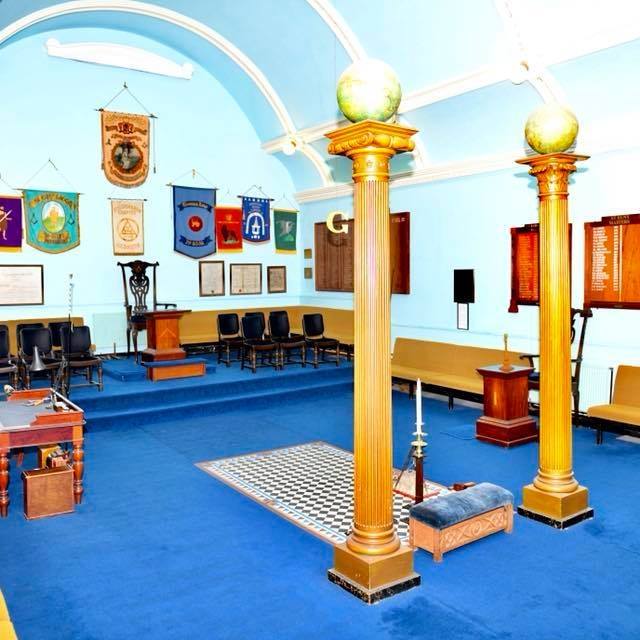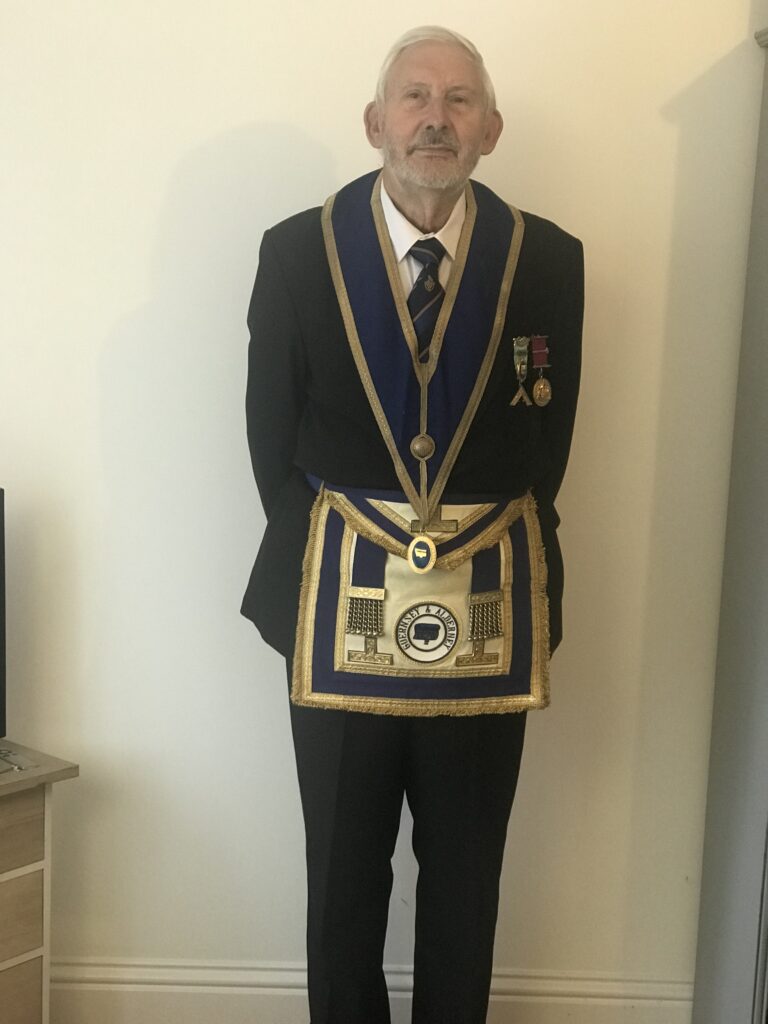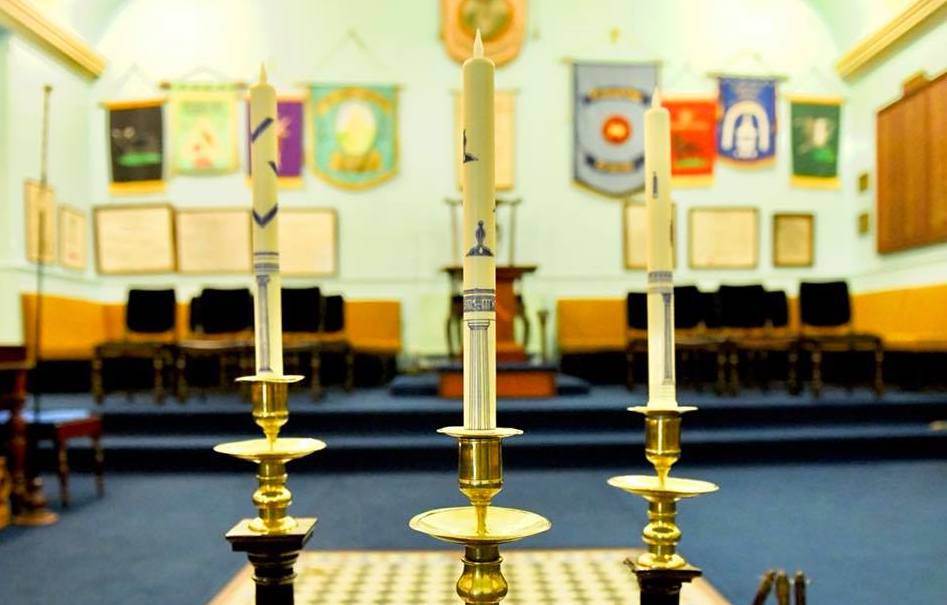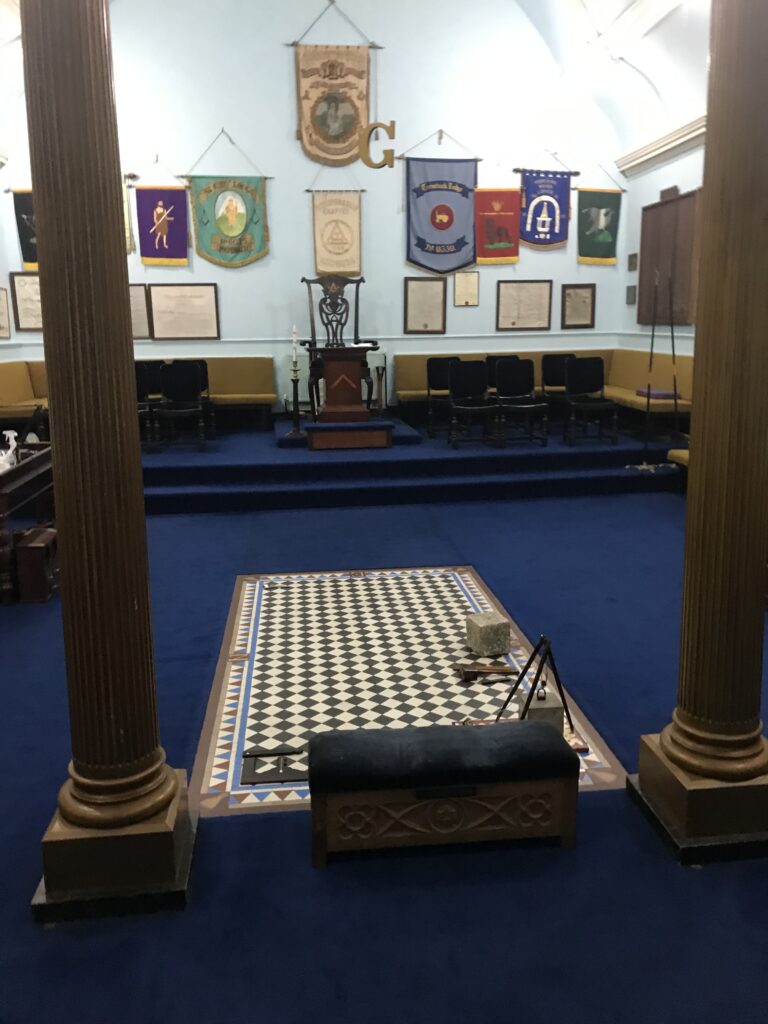FREEMASONS ARE PART OF AN ANCIENT, OFTEN MISUNDERSTOOD SOCIETY, KNOWN FOR ITS ‘SECRETS’ AND SYMBOLS. BUT MASTER OF ST EUNY LODGE IN REDRUTH, MIKE AIRETON, SAYS THERE ARE NO SECRETS AND ALL ARE WELCOME...
What do we think we know about Freemasonry? That it began as a mysterious cult during the Dark Ages? That it is full of Freemasonry secrets, symbolism and Satanic rituals? That it’s a holy religious organisation that distrusts atheism? That its members ‘scratch each other’s backs’, engage in odd handshakes and cover for each other’s crimes? That it effectively rules the world?
Yeah, there’s are fair amount of absolutely untrue myths surrounding Freemasonry. But what do we actually know about the organisation that is accurate? Well, we certainly know that it is one of the oldest social and charitable organisations on the planet which was built on the solid foundations of the medieval stonemasonry guilds of yesteryear. We know that it stretches back over hundreds of years and is full of tradition and ceremony.
We also know that there is a focus on four key ‘values’ in a Freemason’s life: respect, integrity, charity and friendship. We know that any man over the age of 18 can apply to become a Freemason and we know that there are women’s guilds too nowadays.
We also know that Freemasonry ’empowers members to be the best they can be’. We know that more than 150,000 people are Freemasons in the UK today. And we know that the Freemasons do a huge amount for charity on an international scale. In 2020, for instance, the UK’s Freemasons contributed £51.1 million to ‘deserving causes’ worldwide.
In Cornwall, we know that there are around 80 lodges in 37 different locations across the Duchy. We know there are roughly 3,500 Freemasons in Cornwall. That’s a good number of Cornwall Freemasons. We know they meet at different times and support different charities. We know there’s a long tradition of Freemasonry in Cornwall that is still going strong today.
We know a lot about the Freemasons. So it’s surprising that some people, even in 2023, get the facts all wrong, according to Redruth Masonic Hall’s St Euny Lodge Master Mike Aireton. “Some people still think that we are a closed society with all sorts of secrets and hidden symbols,” he says. “But, in reality, we are completely open, charitable and community-minded. There are no secrets at the Redruth Freemasons. In fact, there are no secrets at the Freemasons at all!”
 The interior of the Redruth Masonic Lodge
The interior of the Redruth Masonic Lodge
A passionate Freemason
Before we proceed, Mike Aireton is keen to let our readers know this: that his opinions are his own personal views and are not in any way representative of the opinions of all Freemasons. The facts will always remain the same but opinions, of course, can vary wildly in Freemasonry, as with any organisation.
However, the 80-year-old is nevertheless passionate about Freemasonry and the good that it does. So much so, in fact, that he, along with his lodge’s brethren, organised an open day on Saturday 9 September 2023, which happened to take place during the annual Redruth International Mining and Pasty Festival 2023.
The Redruth Masonic Hall in Redruth‘s Green Lane, which is home to St Euny Lodge, Trevithick Lodge and the Druids Lodge, opened between 10am and 5.30pm to anyone who wanted to see its grand interior and find out more about the local Freemasons from its current members. Here was the piece we wrote about it before it happened: Redruth Masonic Hall Open Day 2023.
Aireton was born in Sherborne in Dorset. He lived and was educated there during the early part of his life. He left as a young man and went off to Porton Down, a science and defence technology campus in Wiltshire, where he worked as a microbiologist. However, he says that ‘they didn’t pay me enough’ so ‘I grabbed an Alsatian and padded around the perimeter and then they paid me more’.
Subsequently, though, Aireton went ‘into the family business, which was garden centres’ and moved with his retiring parents to Alderney, which is part of the Channel Islands and lies just off the French coast. He went into the building industry there and ‘eventually built the office block in the middle of town’ before ‘selling my interest in that’.
After his years in the building industry, Aireton ‘joined the local branch of an international trust fund management company’ in Alderney and became the firm’s archivist for 13 years. He retired at 72 years old but acknowledges that it wasn’t a real retirement as ‘the world always pursues me and asks could you just, could you just, could you just…’.
 Mike Aireton stands proud in his ceremonial apron
Mike Aireton stands proud in his ceremonial apron
“Prior to moving to Alderney,” says Aireton, “I hadn’t really thought about Freemasonry. But after I moved there, I discovered that this idea that you have to be invited to the Freemasons is an urban myth. The exact opposite is true. If you want to join the Freemasons, you have to apply. You have to ask, unprompted.” So he did just that and joined the Freemasons in Alderney in 1984.
Aireton, who has a daughter who lives in Salisbury, became Master of a lodge in Alderney in 1991. He was Master again in 1999. And 18 months ago, he moved with his wife to Cornwall. He had lived on Alderney for more than 40 years but decided to move to ‘be with the family in Cornwall’. His wife has two sons and five grandchildren who live on the outskirts of Redruth.
In Cornwall, he joined the St Euny Lodge at Redruth Masonic Hall. “After only nine months,” he tells Proper Cornwall, “I was absolutely astounded when they said ‘Mike, can you take over as Master next year?’. So, I was installed in the chair of this lodge back in May 2023.”
Informality and equality
Mike Aireton, who says that Freemasonry is like an ‘ancient trades union’, says he has enjoyed being the Master of Redruth‘s St Euny Lodge over the past few months. One of his big drives, however, has been to organise the open day on 9 September and make sure that plenty of locals know about it as ‘it’s a chance to take a look at what we do here in Redruth‘.
He says: “The open day is not a recruitment drive because Freemasons don’t invite people to join. All we do is to say that this is what we are and this is what we do and if you’re interested in us then we will tell you more.”
St Euny is the smallest lodge at Redruth Masonic Hall, according to Aireton. “Obviously,” he says, “we would like a few more members but that’s not a priority for us. If anyone asks to join then we are glad to have them on board but the open day is more about letting people have the chance to talk to us, to see our hall and to find out more about us.”
“Freemasonry is a lot more informal than people think,” continues Aireton. “The idea that Freemasonry is elitist is extraordinary. If you go back to my lodge in Alderney then five years ago, our Master drove a dustcart. Four years ago, he was a jobbing plumber. Three years ago, he was a very skilful stonemason. Two years ago, he was a taxi driver. And a year ago, he was a retired odd job man.”
“This year,” concludes Aireton, “he’s a stevedore of the docks and it’s going up market next year as he will be a teacher at a local school. The President of Alderney has previously been the Master. There’s also been a local bank manager in the chair. To conclude, anyone who claims we are elitist: we are not.”
One of the aspects that Aireton claims he is most proud of is the idea of ‘equality’. He calls this ‘a principal thought in Freemasonry’. “You go in as brethren to a lodge,” he says. “As an equal. You may talk to a Duke. You may talk to a road sweeper. It doesn’t matter. You are all equal in a lodge.”
“Traditionally,” he adds, “we don’t discuss religion or politics because the other people you are talking to are brothers. It doesn’t matter what their religious or political beliefs are. In fact, if you are a Muslim or a Christian or a Seikh or whatever, it just doesn’t matter. You are a brother.” However, according to Mike Aireton, there is one group of people who are not allowed into Freemasonry on account of their (lack of) beliefs…
Atheism and Freemasonry
One curious fact about the Freemasons is that it’s claimed that it’s not a religious organisation and stands for equality, however atheists can’t become members. In fact, says Aireton, there are ‘only two qualifications to become a Freemason’. One is that ‘you must ask to join’ and, having asked to join, you must ‘say you believe in a god or supreme being’. “For example,” he says, “if you are a Buddhist then you don’t believe in a god but you do believe in the cycle of life, which is good enough.”
However, the fact that many good, charitable atheists may not be allowed to join could be a cause for debate in modern British society, especially given that the 2021 Census, published by the Office of National Statistics, showed that 37 per cent of the population of England and Wales identified with ‘no religion’. Also, a British Social Attitudes Survey found in 2020 that just over half of all British adults belonged to ‘no religion’. About eight per cent of the UK’s population identified with being an ‘atheist’, according to 2018 figures.
Aireton admits that the definition of ‘an atheist’ in Freemasonry is ‘somebody who states categorically that there is no god’, despite the fact that atheism, in modern society at least, often refers to those people who ‘do not believe in a god’ but are open to change their views should evidence for one ever be presented.
It’s an interesting fact as Freemasonry seems to be so open to anyone with any belief system. Even if it was open to atheists in the modern ‘nonbeliever but open to new evidence’ meaning of the word and specifically only excluded those who said they knew there was no god or gods and could never be swayed from that position, then the organisation could still be seen as excluding good, charitable people who just hold a different view on the universe to others. However, there are apparently a handful of Grand Lodges across the world that do welcome all people, whatever their religious or lack of religious beliefs may be.
The reason for bringing this up? It has been suggested by other Freemasons that believing in a ‘supreme being’ means that members can be ‘held accountable’ for their actions throughout their lives. Aireton says: “If you apply to join the Freemasons, they will ask you whether you believe in God or a supreme being and if you say that you’re in two minds about this but you think quite possibly that there is, then that’s fair enough.” Aireton is passionate about showing how ‘equality’ is important in modern Freemasonry.
“It is categorically not a religion,” says Aireton, who does mention that ‘there is pretty strong evidence that the masonic concept existed way back in ancient Egypt and you can track it all the way through to today’. “People say we worship the devil. We don’t worship anybody!”
 Three symbolic candles inside Redruth’s masonic lodge
Three symbolic candles inside Redruth’s masonic lodge
Friendship and charity
For Aireton, being a Freemason means he gets to make a lot of good friends and he gets to do good for charity. “I get a lot of friendship out of Freemasonry,” he tells us. “And I like to be part of an organisation that internationally is doing a lot of good. The public doesn’t get to hear about masonic charity often, simply because we don’t shout about it. We just get on with it.”
Aireton cites, for example, the Boxing Day tsunami in 2004 that hit countries like Thailand, Indonesia and Sri Lanka. He says that ‘while the waters were only just receding from the beaches, Freemasonry had already sent very substantial sums to the rescue funds’. He adds: “When it comes to international emergencies, if it happens then we are there.”
But where do these funds come from? Aireton says: “We do raise money with activities like raffles but principally, I pay £150 a year for my membership and most of that goes into the charity pot. Some of it goes back into running Freemasonry but most of it is for charity.”
Aireton, who notes that the Freemasons in Redruth sometimes set up stalls at local events and ‘are often visible in the community’, says he doesn’t know exactly how many Freemasons there are in Cornwall but states that ‘there are not enough, simply because of all those hundreds of thousands of people out there who may want to join but think that you have to be asked to join the Freemasons’.
He believes that if that ‘you have to be invited’ myth was completely dispelled and potential members knew that they had to apply rather than wait to be invited to a lodge, then numbers could increase in the Duchy.
Leader of ceremonies
As a Master of a lodge in Cornwall, Aireton leads the ceremonies. He says: “If you think about the Middle Ages, out in the streets at Christmas time, there would be ‘morality plays’ with Morris dancers and whatever going on. Those plays were literally illustrating morality. It’s the same with a Freemason’s ceremony.”
“Go back to the days of the old guild lodges,” continues Aireton. “All their working tools had a specific function but they also had a moral connotation attached to them. So you’d pick up your square and that would remind you of morality. You’d pick up a plumb rule and that reminded you of uprightness. You’d pick up a level and that reminded you of equality.”
“Our job,” he concludes, “if you like, is that if there is a sudden desperate need somewhere, it’s up to us to do something about it.”
There is the Provincial Grand Lodge of Cornwall, which was established in 1751. And there are ladies’ lodges in the Duchy too. “There are no ladies’ lodges in Redruth,” claims Aireton, “but there are two in Truro. They are not actually part of the masonic movement but they have their own female Freemasonry and there’s a strong, friendly link between the two.”
Secrets and conspiracies
So what about these conspiracy theories, then? Why do so many people believe there are so many secrets hidden in Freemasonry? “Go online and look up Freemasonry and search for the conspiracy theories out there,” advises Aireton. “As a Freemason, whenever you do this you end up shrieking with laughter.”
“The author Dan Brown, for instance, I’ve enjoyed his stories,” he continues. “Freemasonry comes into some of his stories and actually, he’s got quite a lot of it right when it comes to the symbolism. He certainly created a lot of interest in Freemasonry through his books.”
“Dan Brown tells stories that use Freemasonry as a background,” says Aireton. “He hasn’t done anything harmful in depicting that background. He may have made Freemasonry a little more esoteric than it actually is but, for me, the way he dealt with the subject is quite legitimate. He talks about the secrets of Freemasonry but, as I’ve said before, there are no secrets in Freemasonry. Not any more.”
 The interior of the Redruth Masonic Hall
The interior of the Redruth Masonic Hall
But what about the ‘secret word of a Freemason’? “People who are not Freemasons still whisper about this,” says Aireton with regards to a ‘word’ that was once secret in Freemasonry which had to be kept guarded by every member. Many people know what this word is today.
“If you go back to, say, 1820, all the secrets of Freemasonry were known throughout the world,” he says. “But it’s not the secrets themselves that are important. The thing is that, when you become a Freemason, you are told what that secret word is and you will demonstrate your integrity by keeping that secret to yourself and not revealing it to anybody. The word may be known anyway but the manner in which you respect it and demonstrate your integrity by looking after it, that is what’s important.”
Aireton states, as we end our interview: “If you become a Freemason then you are in effect declaring that you are a man of honour, honesty and integrity, and you intend to continue to be so. Sometimes we do see people who are clearly interested in becoming a Freemason but we can’t say anything and we must wait for that person to say ‘I would like to join’ and then we can say ‘of course you can join! All you have to do is ask!'”
Seek ye the Redruth Masonic Hall. That’s all you have to do. Catch one of these friendly Freemasons and ask them all about the organisation. There. Proper Cornwall has revealed the secret to you. Even though we now know that there are no secrets in the Freemasons…